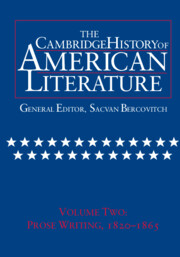Book contents
- Frontmatter
- Introduction
- CONDITIONS OF LITERARY VOCATION
- THE LITERATURE OF EXPANSION AND RACE
- THE TRANSCENDENTALISTS
- 1 Unitarian Beginnings
- 2 The Assault on Locke
- 3 Carlyle and the Beginnings of American Transcendentalism
- 4 “Annus Mirabilis”
- 5 The Establishment and the Movement
- 6 Letters and Social Aims
- 7 The Hope of Reform
- 8 Diaspora
- 9 The Antislavery Years
- NARRATIVE FORMS
- Chronology
- Bibliography
- Index
9 - The Antislavery Years
from THE TRANSCENDENTALISTS
Published online by Cambridge University Press: 28 March 2008
- Frontmatter
- Introduction
- CONDITIONS OF LITERARY VOCATION
- THE LITERATURE OF EXPANSION AND RACE
- THE TRANSCENDENTALISTS
- 1 Unitarian Beginnings
- 2 The Assault on Locke
- 3 Carlyle and the Beginnings of American Transcendentalism
- 4 “Annus Mirabilis”
- 5 The Establishment and the Movement
- 6 Letters and Social Aims
- 7 The Hope of Reform
- 8 Diaspora
- 9 The Antislavery Years
- NARRATIVE FORMS
- Chronology
- Bibliography
- Index
Summary
In Italy Margaret Fuller had discovered what it felt like to be caught up in historical processes larger than those any individual could control – to be unable to refuse participation, to be forced to watch helplessly the outcome of events. In the winter and spring of 1850 events in the United States Congress would give the other Transcendentalists a similar experience. By the terms of the Treaty of Guadelupe Hidalgo in 1848 Mexico had ceded huge tracts of western land to the United States. The question immediately arose: would slavery be permitted in the new territory? Mexico had abolished slavery, but settlers from the southern United States were determined to reintroduce it, less because they thought slavery likely to flourish there (the arid climate was unsuitable for the crops that needed slave labor) than because they feared they would be encircled by new free states formed from the Mexican Cession, which would upset the balance of power they had up to then maintained in the Senate.
Two years earlier, a freshman Democratic congressman from Pennsylvania named David Wilmot had startled his colleagues in the House of Representatives, which was then debating the possibility of purchasing territory from Mexico, by offering an amendment to the appropriations bill that made it “an express and fundamental condition” to the acquisition of territory from Mexico that “neither slavery nor involuntary servitude shall ever exist in any part of said territory.” This famous Wilmot Proviso was never adopted, but under its threat Congress quickly divided — not along party lines (Whig against Democrat) but along sectional ones (North against South) — in a way that seemed ominous for the future of the Union.
- Type
- Chapter
- Information
- The Cambridge History of American Literature , pp. 548 - 604Publisher: Cambridge University PressPrint publication year: 1995

